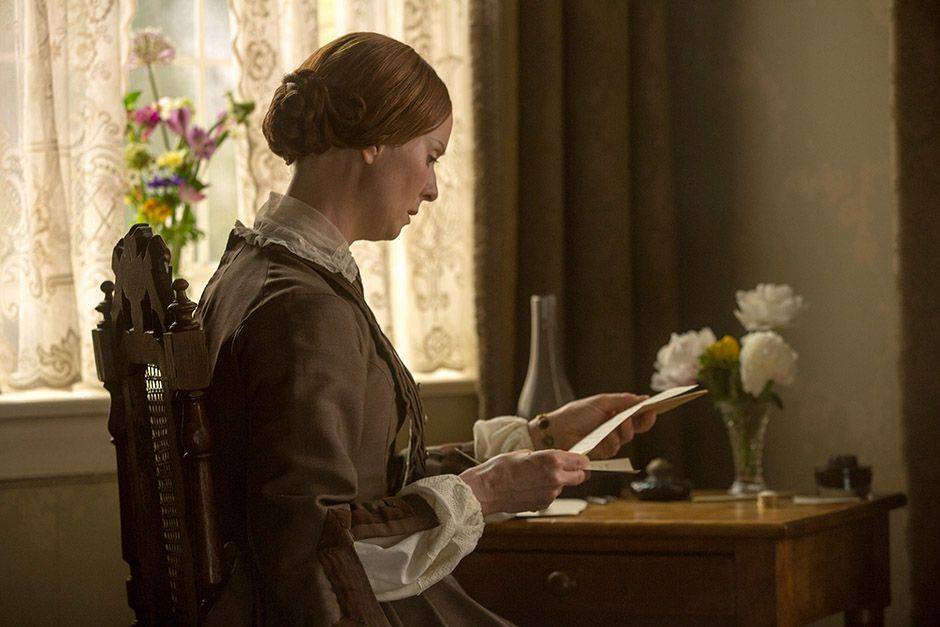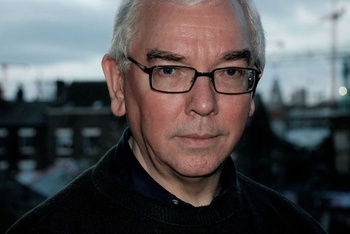In A Quiet Passion, which won the Grand Prix at the recent Film Fest Gent, British director Terence Davies brings a remarkable and colourful portrait of the American poet Emily Dickinson. "It's not a biopic, it's only my version of her life."

Director Terence Davies peeks into the life of Emily Dickinson
If Bob Dylan makes poems for the ears, then Terence Davies makes poems for the eyes. This link is quickly made if the day you interview Davies happens to be the same day on which Dylan received the Nobel Prize for Literature. The director of melancholy gems like Distant Voices, Still Lives, The Long Day Closes, and The Deep Blue Sea has in recent years sometimes had difficulty getting his projects off the ground. But his fortunes seem to have changed now. Last year he finished Sunset Song, a sensual melodrama about a Scottish farmer, which hasn't yet found a Belgian distributor. And Davies, a very original director whose films are never set in the present day and in which music always plays an important role, now also has a new movie in the pipeline, a drama about the English poet and soldier Siegfried Sassoon.
Poetry is also at the heart of A Quiet Passion, an often funny but also brazen portrait of the 19th-century poet Emily Dickinson who is magnetically played by Sex and the City actress Cynthia Nixon. Although this artsy drama is set in Dickinson's hometown Amherst in Massachusetts, the interiors of her family house were exactly rebuilt in a studio in Lint, Antwerp, while the Brussels Philharmonic performs the beautiful soundtrack. "We had a fabulous cast and crew, I can tell you," says Davies. "A lot of the actors playing minor rolls are all Belgians but they have a terrific American accent. They were all lovely people to work with. It was a joy from beginning to end."
Why was it so important for you to make this film on Emily Dickinson?
TERENCE DAVIES: I think she's the best of the American poets of the 19th century. I can't read Walt Whitman. I couldn't care less. I just feel that she deserves it because she's a great poet. And even if she isn't read enough, she will be championed like all great artists. People will find her. It would be the best reward if after people see the film, they want to go and read her.
How long have you been a loyal reader of her work?
DAVIES: I discovered her when I was 18. I first heard her name on television. It was Claire Bloom reading her work and the first poem was "Because I could not stop for Death – He kindly stopped for me". So I went out and bought an anthology. And about five years ago, I wanted to know more about her because I started rereading her. And I read six biographies. Her inner life was so rich! She did very ordinary things as well, I mean not just write poetry. She wrote three volumes of letters. She was also a very good pianist and she loved baking and dancing. So she was like us all, except that she just happened to be a genius.
Dickinson writes a lot about spiritual matters, God, and religion. And she had a strong family bond. There are a lot of similar themes in her life and work, and in your movies.
DAVIES: Yes, very much. I was raised Catholic. I was very devout until I was 22. Then I realised that it was all a lie and I stopped going to Mass and never went back. That did leave an enormous sense of guilt, though. But Dickinson wasn't a Catholic, she was Episcopalian. Actually, there is a constant oscillating in her poetry between whether or not it is true. And she never comes down on either side. Even if she believes that there is a god, she must have had doubts. Even the most divine people have doubts. Anton Bruckner is my favourite composer. At the end of the 9th Symphony there is a huge dissonance. A dissonance in Bruckner! For one moment even he had his doubts, and wondered: "Is it all a lie?"
There is another common point. Like Dickinson you haven't always got the acclaim and support that you deserved.
DAVIES: I'm not universally loved, that I can tell you. A lot of people hate what I do and have said so. But you can't predict what an audience will do. All you can do is say: "This is the way I saw it and make the best film that you can and hope for the best." Because in the end if the audience doesn't like it, there's nothing that you can do about it. What creeps in perhaps is that your films are lousy and not good anyway; and that's the hardest thing.
Only seven of Dickinson's nearly 1,800 poems were published during her lifetime and they all appeared anonymously. As an artist, can you understand her attitude of creating in seclusion, without longing for recognition?
DAVIES: Even the greatest writers are vain. We all want to be recognised for what we have done. Everyone does, even if she only published between seven and eleven poems in her lifetime and even in those the punctuation was altered. If you read her poems with her punctuations, it's very eccentric but it actually makes a lot of sense. You don't wish to live in isolation. That's something that you don't choose. But it might be thrust upon you. I think that she did want to be published and at least have some sort of reputation, as I present in the film. But that is only my point of view, it is not biographical fact.

© Sol Papadopoulos
DAVIES: I hadn't thought of that. There are a lot of theories that she had a love affair, which I don't believe. I think that she wants this looming man, and looming in English has quite a frightening meaning. She says it: "I don't know what it is but I'm frightened of it." It would be nice to fall in love and have someone with you. But you can also be frightened of that, to auto-surrender yourself to somebody else. A lot of people are frightened of that. I'm one of them. That's why I choose to live alone. I don't think that it's a sexual ecstasy. It's a spiritual one, because it's yearning for something, for someone to say, there is a god and your soul will go there and you will be content. And even if it were sexual, she's probably too hypersensitive to publically go through with it or act on it. As a British statesman once said about sex: "The position is ridiculous, the pleasure momentary and the result damnable."
A Quiet Passion
UK, BE, 2016; dir.: Terence Davies, act.: Cynthia Nixon, 125 min.
Fijn dat je wil reageren. Wie reageert, gaat akkoord met onze huisregels. Hoe reageren via Disqus? Een woordje uitleg.